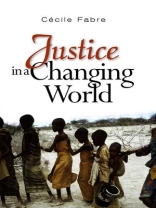Should governments give special rights to ethnic and cultural
minorities? Should rich countries open their borders to economic
immigrants or transfer resources to poor countries? When framing
and implementing economic and environmental policies, should
current generations take into account the interests of future
generations? If our political community committed a wrong against
another group a hundred years ago, do we owe reparations to current
members of that group?
These are just some of the pressing questions which are fully
explored in this accessible new analysis of justice in the
contemporary world. They force us to reconsider the extent of our
obligations to our fellow citizens, future generations and
foreigners.
Justice in a Changing World introduces the moral debates
around issues such as immigration, national self-determination,
cultural rights and reparations, as well as resource transfers from
one generation to the next and from rich to poor countries, through
the lenses of liberalism, communitarianism and libertarianism. In
so doing, it helps to unravel the complexity of key ethical
dilemmas facing us today.
The book will be a valuable resource for students of political
theory, and will appeal to anyone wishing to reflect on their
deepest values and commitments by putting them to the test of
practical politics.
Tabla de materias
Chapter 1 Setting the stage.
1. Introduction.
2. Egalitarian liberalism.
2.1. Rawls’ Theory of Justice.
2.2. Egalitarian liberalism post Rawls I: luck
egalitarianism.
2.3. Egalitarian liberalism post Rawls I: sufficientism.
3. The communitarian critique of Rawls: individuals and
communities.
4. The libertarian critique of Rawls: justice as
entitlements.
5. Themes and issues.
Chapter 2 Justice towards future generations.
1. Introduction.
2. Egalitarian liberalism and future generations.
2.1. Rawls’ just savings principle.
2.2. Luck egalitarianism.
2.3. Sufficiency.
3. The transgenerational community: a source of obligations to
our successors.
4. Libertarianism and future generations.
5. Two objections to obligations to future generations.
5.1. Rights, obligations, and non-existing people.
5.2. The non-identity objection.
6. Conclusion.
Chapter 3 Multiculturalism .
1. Introduction.
2. An egalitarian liberal position: Kymlicka’s defence of
minority rights.
3. Communitarianism and minorities.
4. A libertarian position: Kukathas’ liberal
archipelago.
5. Conclusion.
Chapter 4 National self-determination.
1. Introduction.
2. Liberal nationalism.
3. Communitarianism and national self-determination.
4. Libertarianism and national self-determination.
5. Conclusion.
Chapter 5 Global distributive justice .
1. Introduction.
2. Egalitarian liberalism and global distributive justice.
2.1. Luck egalitarianism, sufficientism and the irrelevance of
borders.
2.2. Egalitarian liberalism and the moral relevance of borders
I: Rawls’s.
Law of Peoples.
2.3. Egalitarian liberalism and the moral relevance of borders
II: Nagel’s.
political conception of justice.
3. Communitarianism and global distributive justice.
4. Libertarianism and global distributive justice.
5. Conclusion.
Chapter 6 Immigration .
1. Introduction.
2. An egalitarian liberal case for relatively open borders.
2.1. A Rawlsian view on immigration.
2.2. Egalitarian liberal arguments for open borders.
2.3. Open borders and distributive justice: sufficiency and
immigration.
3. A communitarian position: Walzer on immigration.
4. A libertarian position: Hillel Steiner on immigration.
5. Who should take in immigrants?.
6. Conclusion.
Chapter 7 Reparation for past injustices.
1. Introduction.
2. Egalitarian liberalism and reparative justice.
2.1. Luck egalitarianism, sufficientism, and reparations.
2.2. Refining the egalitarian liberal position.
3. Communitarianism and reparations.
3.1. The transgenerational community: in defence of
reparations.
3.2. Judging the past: a very limited defence of
reparations.
4. Libertarianism and reparations.
5. Conclusion.
.
Conclusion.
Works cited
Sobre el autor
Cécile Fabre is Professor of Political Theory at the University of Edinburgh.












